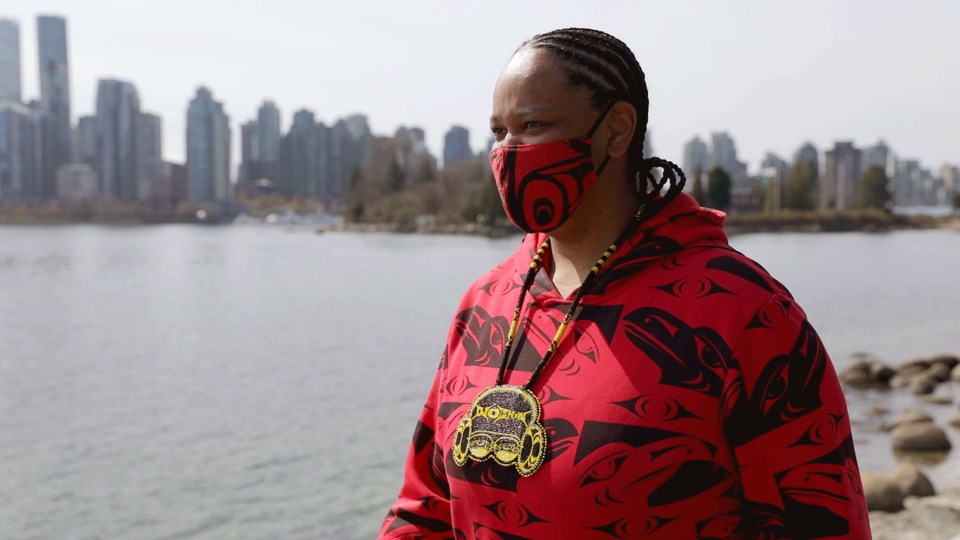Orene Askew is many things – a DJ, a motivational speaker, a two-spirited Afro-Indigenous person, and former Sḵwx̱wú7mesh Úxwumixw (ߣ������Nation) councillor – but never before have these intersections and identities been captured all at once. Until now.
Showing at the Vancouver Short Film Festival later this month, The O Show, a documentary by production company Human Biography, showcases Askew in full, with the diversity of her identity front and centre.
“I've worked with quite a few videographers over the years, and they haven't been able to catch every aspect of my life. Being two-spirited, being Black, and being Indigenous, sometimes they only capture just one or maybe two,” she said.
Approached by Human Biography’s Sharad Khare at the end of an alumni talk at BCIT, Askew, 38, said a documentary like this was something that she’d wanted to do for a long time.
“They always said, ‘This is your story.’ They never tried to take it over or put words in my mouth. They just captured everything that was the real deal.”
The 20-minute documentary follows Askew and touches on multiple facets of her life, personal and professional. Followed around like a “reality celebrity,” Askew said it was really special to have her friends and family included in the project.
“They included my family and people who are in my everyday life, who supported me over the years, which I thought was really incredible that they caught that as well.”
Going to the now shuttered School of Remix in Vancouver to learn DJing, the documentary also includes artists who Askew has since mentored, passing along knowledge, skills and information about the industry.
“Indigenous people are taught from a very young age [that] you pass on information, you don't hoard it. And if there's someone that wants to do it, you want to tell them how to do it, and I've always had that attitude.”
A really generous look into Askew’s life, the documentary highlights how important the representation of Black, Indigenous, queer people is.
“It's really important to share, because I feel like a lot of people are watching and listening, especially nowadays. It's so cool to be alive right now, because there's so much change happening,” she said excitedly.
“Our young people are coming out at a younger age, saying that they're two-spirited. And it's funny, because some people say they're so young and they don't know, but they do know, that's the thing.”
Askew said there’s a stigma around people needing to “choose” their identity, or identifiers early on, but it’s not permanent and can change and grow with time.
“The fact that we've got these young people in my community that feel safe, and they feel strong enough to actually say that [they’re two-spirited], I think that means that we're getting somewhere, we're doing right.”
Askew said she looks at herself as part of the middle of generational change. With her mom attending residential day school in North Vancouver, she said the younger generation now are able to speak up in ways not seen before.
“The young people are able to speak up, say how they're feeling, and that was almost illegal for my mom's generation to say, ‘This isn't right, you can't be sending us to residential school,’” she said. “But now, the young people have an opinion and they can say what they want to do, and what they don't want to do. I think it's really cool to be in the seat that I'm in, to see the changes, and be able to be a part of it as well.”
While she continues to learn from young people, Askew said she’s glad she can also be a support for them when they have questions about their identity.
“What Elders have said to me before, the advice they have given me, is when you're younger, you think something is the biggest deal in the world, and you stress over it,” she said.
“And I hear our young people saying, ‘I’ve been stressing with my identity,’ and I try to reassure them that it's OK, that it can change. I told my niece once, ‘You know what would be really cool, is if you were every letter on the spectrum [LGBTQIA+] every day.’ That would be so cool.”
Finishing up her time on ߣ������Nation council at the end of last year, Askew has more space and time now to dedicate to her craft – one which she thinks she has more power with, anyway.
“It's definitely less stressful [now]. Yeah. One of our young people said, “You know what, Auntie O Show, I think you're gonna have more power when you're off the council.’ And I'll never forget when she said that to me.
“And I can do it in different ways now, with more artistic freedom.”
The O Show is showing during the Vancouver Short Film Festival, which starts on Jan. 28 and runs until Feb. 6.




